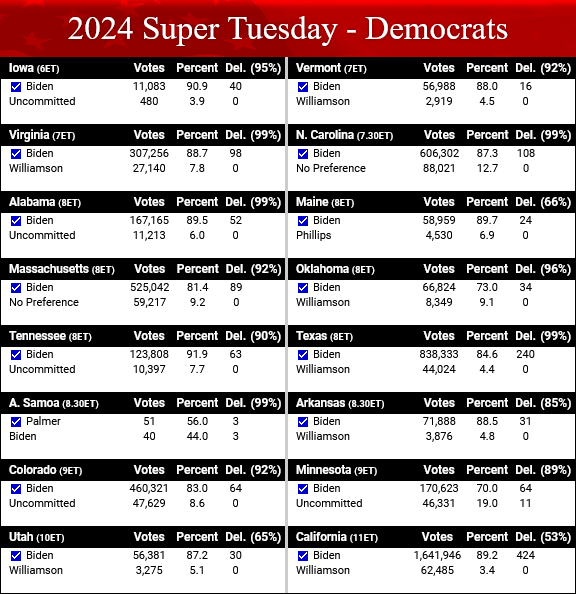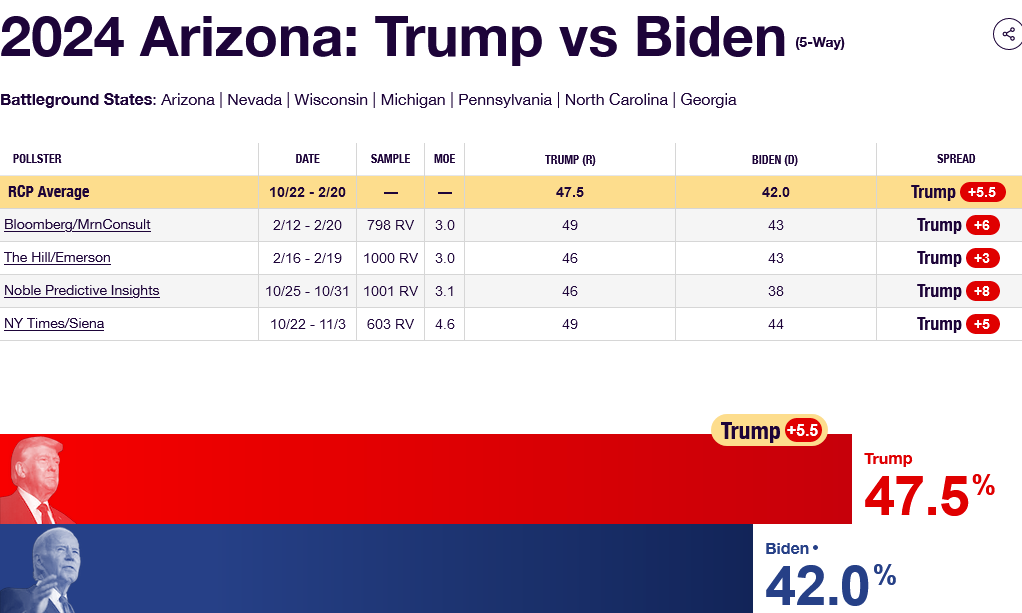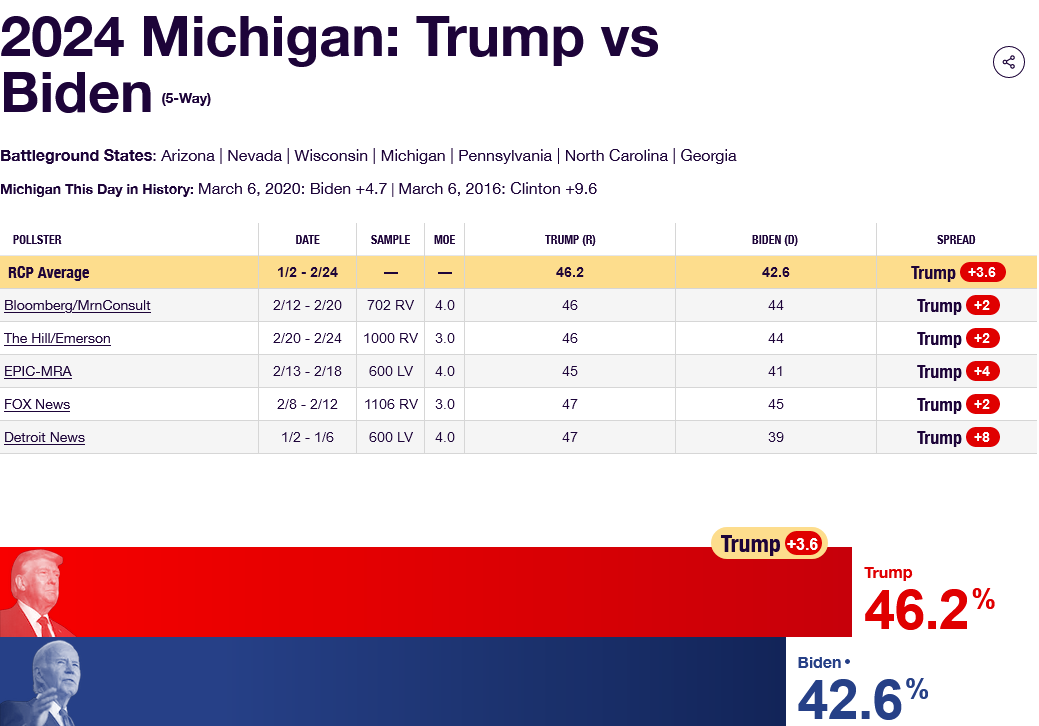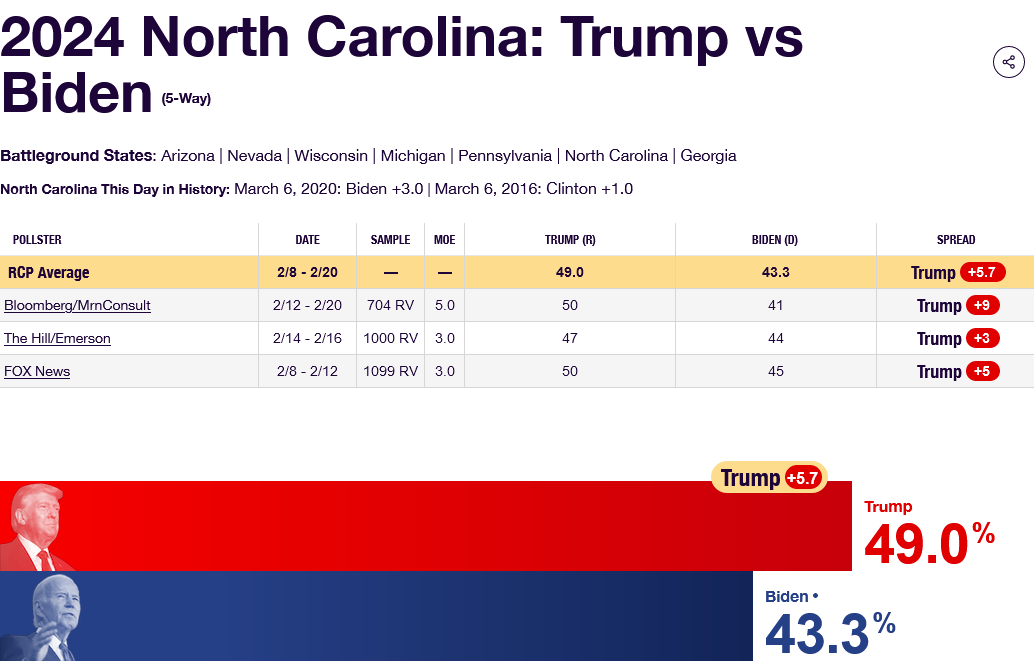And Then There Was One
Haley Drops Out, Setting The Stage For Trump v Biden in The Fall
After what the media somewhat sardonically dubbed the “not-so-Super Tuesday” primaries, the shape of this fall’s Presidential election was made clear.
The picture of the presidential race has hardly been cloudy for some time, even if it is one that most voters say they don’t want to see.
On not-so-Super Tuesday, there were few surprises. It became ever clearer President Joe Biden was on a path to the Democratic nomination that only some kind of personal catastrophe could alter.
His White House predecessor, Donald Trump is headed to a third Republican nomination, and a rematch against Biden — if Trump can navigate the 91 criminal charges against him and avoid any other calamity. Trump’s last major GOP challenger, Nikki Haley, suspended her campaign on Wednesday after being soundly defeated across the country on Super Tuesday.
Neither the Democrats nor the Republicans have produced a credible alternative to Joe Biden or Donald Trump, despite frequent polls indicating that voters are distinctly unenthused about a Trump-Biden rematch.
As Trump handily beat his sole remaining primary challenger, Nikki Haley in New Hampshire on Tuesday, some 67% of respondents polled Monday through Wednesday said they were "tired of seeing the same candidates in presidential elections and want someone new." Still, just 18% said they would not vote if Biden and Trump were their choice.
"I hate to think that we're constantly navigating the lesser of two evils," said Kimberly Sofge, a 56-year-old project manager in Washington, D.C., this week. "I honestly feel that we can do better."
The two candidates themselves seem ready for a rematch following Trump's back-to-back wins in Iowa and New Hampshire, with the White House regarding Trump as a beatable challenger, and Trump fuming because Haley did not immediately drop out of the Republican race.
Regardless of what voter sentiment may be, Trump v Biden is what we will see in the fall election.
Ironically, although both Trump and Biden dominated the Super Tuesday results, neither candidate made a clean sweep of their respective primaries.
Trump dominated the GOP contests—but lost to Nikki Haley in Vermont.
Similarly, Biden captured almost every Democrat primary, except for American Samoa.
Paradoxically, even though voters claim not to want a Trump v Biden rematch, both Trump and Biden dominated all of the Super Tuesday Primaries, except for the two contests which they lost.
The voters may not be wild about Trump v Biden, but they are not seeing much alternative.
Despite winning in Vermont, Nikki Haley departed from her recent pie-in-the-sky behavior of believing that backing by the traditional GOP donor class could compensate for the lack of rank-and-file GOP voter support, finally opting to “suspend” (in reality, “end”) her quest for the GOP nomination.
In announcing her withdrawal from the race, Haley unironically framed her run as an effort to make sure Americans were “heard”.
Nikki Haley, the former South Carolina governor and United Nations ambassador, has officially suspended her presidential bid.
"The time has now come to suspend my campaign," she said just moments into a speech near Charleston, S.C., on Wednesday. "I said I wanted Americans to have their voices heard. I have done that. I have no regrets. And although I will no longer be a candidate, I will not stop using my voice for the things I believe in."
Left unmentioned, of course, was the irrefutable reality that the GOP voters have been speaking loudly and unambiguously since the very first primaries and caucuses: they want Donald Trump back in the White House.
Nevada demonstrated once again that, for better or worse, GOP voters are all in on Donald Trump. They have already made up their minds as to whom they want leading them in the fall campaign, and they want Donald Trump. They do not want anyone not named Donald Trump.
Nikki Haley has been stubbornly refusing to listen to that message from the GOP up until now—and even now is reluctant to get behind the notion of Donald Trump as the GOP contender for President in the fall. Her withdrawal speech pointedly left out any endorsement or expression of support for Trump’s candidacy.
Haley is the last major candidate to challenge former President Donald Trump for the 2024 Republican nomination. She did not endorse the front-runner, her former boss. Instead, she wished him well.
"In all likelihood Donald Trump will be the Republican nominee when our party convention meets in July. I congratulate him and wish him well," she said. "I wish anyone well who would be America's president."
Instead, she challenged Trump to “reach out” to her demonstrably miniscule voter base.
She encouraged Trump to reach out to her voters, calling it "his time for choosing."
"It is now up to Donald Trump to earn the votes of those in our party and beyond it who did not support him," Haley said. "And I hope he does that. At our best, politics is about bringing people into your cause, not turning them away, and our conservative cause badly needs more people."
However, what was left unsaid was the number of traditionally Democratic megadonors funding her quixotic campaign—and Donald Trump is taking direct aim at the political donor class as a whole, calling out Haley donors who believe they can flip to Trump and “buy” access with their checkbooks.
There is only one reason why Nikki Haley is still able to continue her campaign: The usual cadre of Republican deep pocket donors are continuing to refill her campaign coffers, even as Donald Trump has expressed more than a little displeasure at such efforts by the donor class.
The GOP of Donald Trump is strongly populist and avowedly non-corporatist, which means that Donald Trump very likely has no intention of “reaching” out to Haley’s Wall Street backers. That stance has almost certainly contributed to Trump’s ongoing rise in the polls relative to both Nikki Haley and Joe Biden.
If we look at the polling data, Trump’s populist pose is definitely resonating with voters, and not just with Republican voters.
In the last month, Trump has increased his polling lead over Joe Biden by half a percentage point nationwide.
In the “battleground states” identified by corporate media as where the fall election will ultimately be decided, Trump leads by healthy margins.
Only in Pennsylvania is Biden leading Trump:
Given that the polling on the Republican nomination race has been fairly accurate, tracking Donald Trump’s voting outcomes in nearly all of the primaries to date, we are compelled to consider the Real Clear Politics poll aggregates for the general election are of similar accuracy—which means voters across the political spectrum prefer Donald Trump over Joe Biden.
With a replay of the 2020 election now all but certain, GOP voters in particular will almost certainly turn their attentions to concerns of a possible replay of the massive vote fraud that Donald Trump has alleged constantly since the 2020 election, and which he has alleged cost him the 2020 election.
There is no small irony to the possibility that the dominant campaign theme for 2024 is exactly for what Jack Smith indicted Donald Trump.
Even if one does not consider that claim of mass vote fraud to be proven, there were numerous evidences highlighting problems of vote integrity surrounding the 2020 election in multiple states.
Readers may recall that even before Jack Smith indicted Donald Trump over the J6 protest-cum-riot, I warned that these matters were becoming a dominant electoral theme, taking precedence even over policy issues and concerns.
In a very real sense, the charges being leveled against Donald Trump are becoming Donald Trump’s campaign message and campaign theme. The more Trump supporters see these charges as a political persecution of Donald Trump, the more that even disaffected nominal independents such as Alex Berenson—who is no fan of Donald Trump and his “reality TV” tactics—perceive a grotesque injustice in pursuing Trump for what are debatable crimes at best, while allowing those close to the White House to evade charges despite considerable evidence of tax evasion, drug possession and even drug trafficking, as well as innumerable instances of official corruption including bribery, the more the Democrats risk being seen as simply too corrupt to be tolerated any further.
That the Democrats are willing to burn down the nation’s criminal justice system simply to “stop” Donald Trump is a political message that, if it takes hold in the broader electorate, could make even for those not particularly enamored of Trump a second Trump Presidency a better option than a second term of naked corruption and cynical abuse of our governing institutions.
Here we are, eight months later, and vote integrity is already weaving its way into the narratives on the fall election.
A network of right-wing activists and allies of Donald J. Trump is quietly challenging thousands of voter registrations in critical presidential battleground states, an all-but-unnoticed effort that could have an impact in a close or contentious election.
Calling themselves election investigators, the activists have pressed local officials in Michigan, Nevada and Georgia to drop voters from the rolls en masse. They have at times targeted Democratic areas, relying on new data programs and novel legal theories to justify their push.
If vote integrity continues its ascendancy as a campaign issue, the fall election is guaranteed to be filled with controversy and potentially chaos. When we read essays here on Substack such as this one by Omega4America, we are forced to consider that voting processes in this country may be considerably more tainted by corruption than even the 2020 election suggested.
Moreover, it is not merely voter rolls and ballot procedures that are questionable. The efforts to clean up voter rolls and ensure honest elections with only eligible voters casting ballots are themselves allegedly a hot mess of corruption. Yet if voter rolls are tainted with ineligible voters, with inaccurate idenfitication information, and continue to hold out a possibility of vote fraud via 21st century equivalents of ballot-box stuffing, there is almost no way to avoid a replay of the election controversies which emerged in 2020.
The Super Tuesday primaries have confirmed what most people already knew: the 2024 election will be a replay of the 2020 election.
The Super Tuesday primaries have therefore also raised the possibility what many may already fear: the 2024 election will be the chaotic mess 2020 was.
That we may look forward to a summer of political chaos and division is beyond unfortunate. As readers of this Substack already know all too well, there are a great many issues that warrant honest and open debate. Whether one focuses on jobs, on the economy overall, on relations with China, or the wars in Gaza and Ukraine, we live in a world with challenges and difficulties on all sides. We have no shortage of issues ahead of us, and yet all these issues can easily be swept aside—arguably are being swept aside—in favor of narratives of personality, with Democrats and Republicans alike seeking to best portray the other side as radical and dangerous extremists who threaten the very fabric of this Republic.
The Super Tuesday primaries have set the stage for Trump v Biden 2.0. The challenge will fall to the voters to populate that stage with issues, and not just with personalities.




















We plan to spend over a month of this crazy summer in Wyoming camping. Most of it without internet. I cannot fathom what is going to happen. My sister Trump hater is already a loon about it. (No disrespect to real loons). I may be one of those who can’t push the lever or button or whatever for either of them. Nor the rest of the ballot. I don’t know yet.
They are radical extremists on both sides, but they set the agenda for the Democrats & the Uniparty. Then there is Donald Trump. He has his own agenda, but it is America's agenda too.
Let's just see how it plays out.